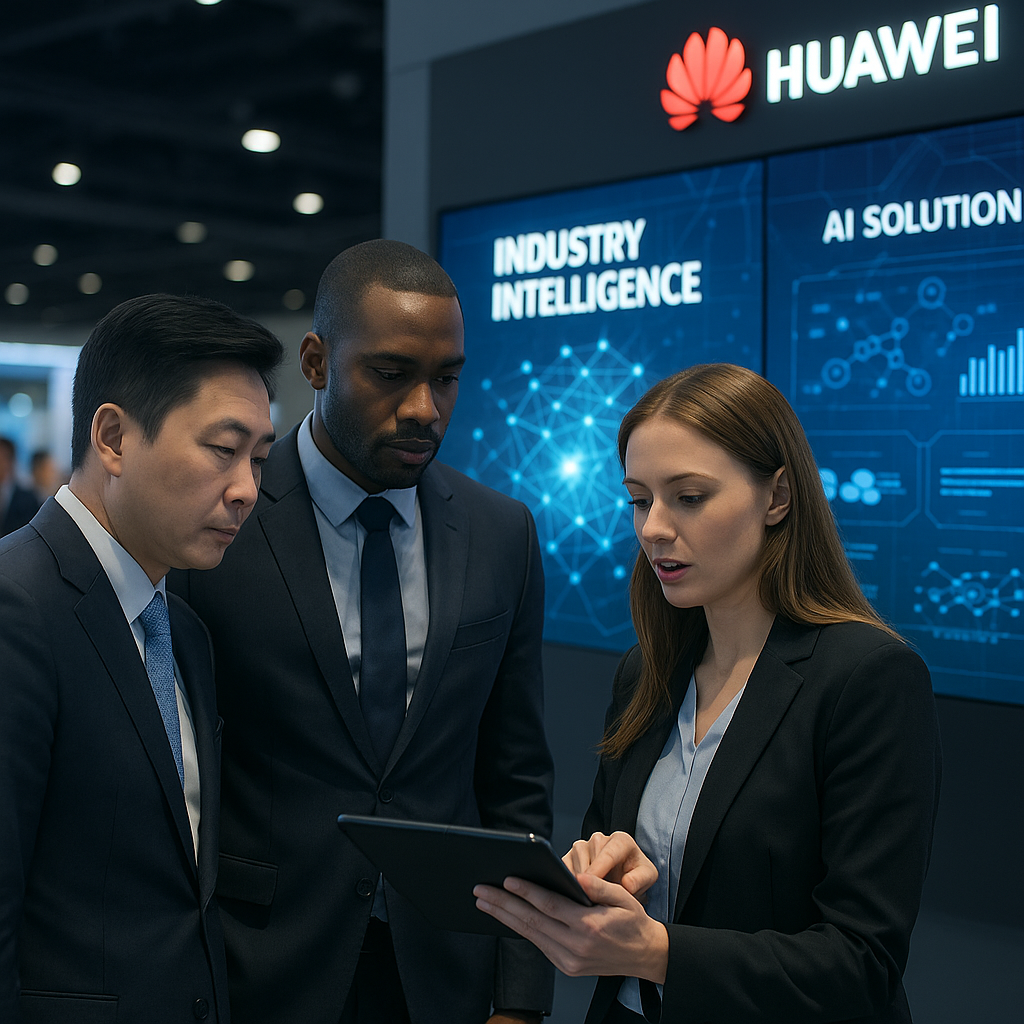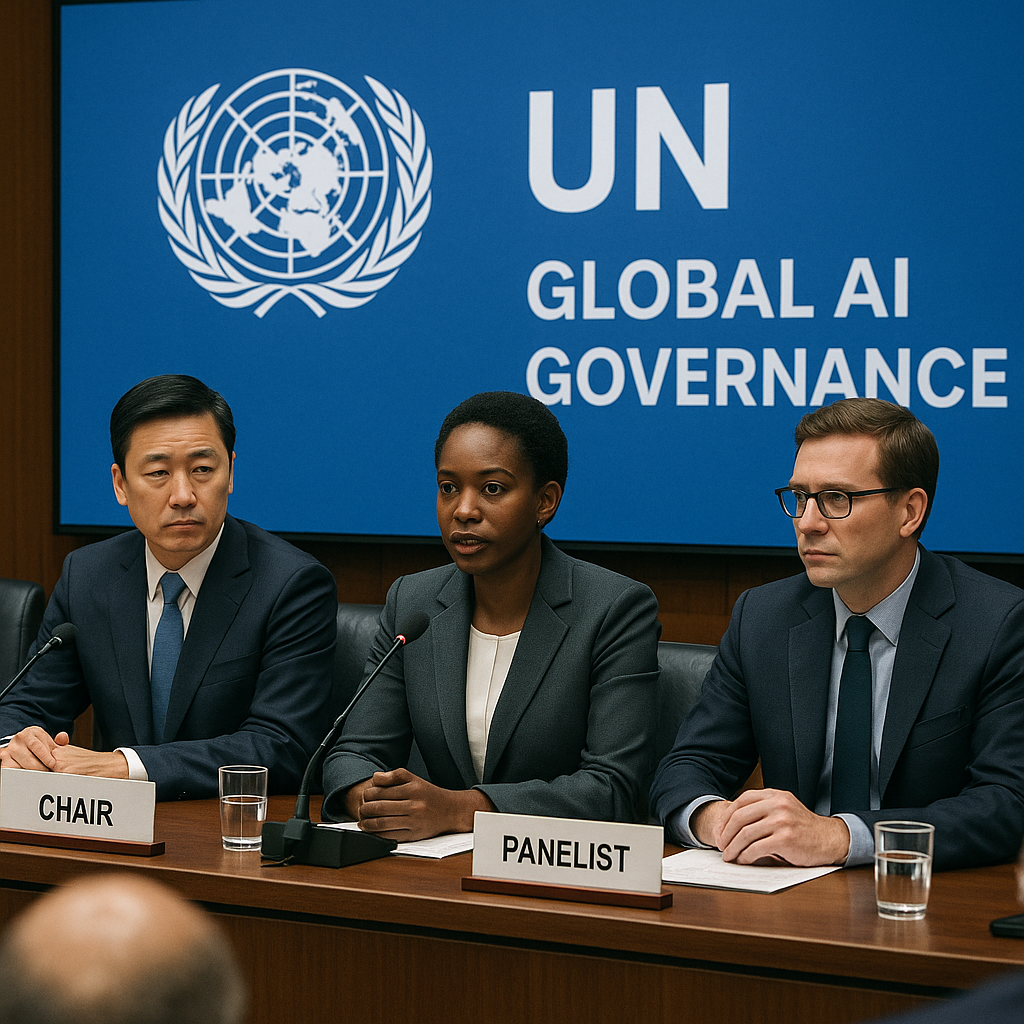AI Decentralization and Global Governance: Key Highlights and AI News from October 15. 2025

These AI articles highlight a fascinating duality: technological decentralization alongside converging global regulations are shaping AI's trajectory. By staying informed, you'll understand how this landscape impacts your business, and you can leverage AI tools to navigate regulatory shifts and decentralized innovation.
Huawei's AI Push at GITEX Global: Industry Intelligence Takes Center Stage
Huawei made a significant splash at GITEX Global 2025 in Dubai, signaling a powerful push into the AI landscape with the unveiling of its next-generation AI-powered solutions. But this wasn't just about flashy demos; it was a calculated move emphasizing practical applications and real-world impact, firmly placing 'Industry Intelligence' center stage. Huawei's focus is laser-sharp: fusing industry operational data with powerful foundation models to unlock unprecedented efficiency and innovation. This approach represents a departure from general-purpose AI, instead honing in on tailored solutions that address specific industry challenges.
AI-Driven Productivity Boost Across Sectors

Huawei's solutions promise tangible enhancements to productivity across key sectors. Imagine telecom networks optimized in real-time using AI-driven analytics, logistics operations streamlined through intelligent routing and predictive maintenance, or manufacturing processes fine-tuned for peak efficiency and minimal waste. These are not just hypothetical scenarios; they're the concrete benefits Huawei is bringing to the table, powered by its robust AI infrastructure. They are also innovating ways to use AI in education, and are likely exploring ways to use AI in Practice within their business.
Huawei's 'Industry Intelligence' Roadmap and Secure AI
Huawei detailed its 'Industry Intelligence' roadmap, showcasing a commitment to long-term AI development and integration. Key components of this roadmap include integrated AI computing fabrics, providing the necessary hardware infrastructure to support demanding AI workloads, and a strong emphasis on sovereign model security. This is a critical consideration as concerns around data privacy and security become paramount in the age of AI. By prioritizing sovereign model security, Huawei aims to build trust and ensure that AI solutions are deployed responsibly and ethically, a theme constantly covered in AI News.
China's Ascending AI Influence and Ecosystem Shift
This move by Huawei underscores China's growing influence in the global AI arena. Furthermore, it signals a potential shift away from Western cloud dependency towards regionally-aligned, vertically integrated ecosystems. This trend could reshape the future of AI development and deployment, with different regions forging their own paths and fostering innovation within their own spheres of influence. It's important to keep abreast of the rapidly-evolving nature of AI, and resources like our AI Explorer and AI Glossary can assist in navigating the often complex terminology and concepts involved.
Huawei's advancements at GITEX Global 2025 mark a significant stride in AI application, with potential ramifications for global AI governance and technological ecosystems. This emphasis on industry-specific AI and sovereign security reflects a broader trend towards decentralized and regionally-focused AI innovation.
UN Launches Global AI Governance Panel: Towards Harmonized Standards
The winds of change are blowing through the world of AI, and nowhere is that more evident than at the United Nations. In October 2025, the UN General Assembly took a monumental step towards shaping the future of AI by launching the Global Dialogue on AI Governance, signaling a new era of international cooperation in the digital age.
A Scientific Beacon: The Independent International Scientific Panel on AI
At the heart of this initiative lies the creation of an Independent International Scientific Panel on AI. Think of it as the IPCC (Intergovernmental Panel on Climate Change), but for AI. Its mission? To sift through the noise and deliver clear, evidence-based guidance to policymakers worldwide. The panel aims to cut through the hype and the fear, providing a solid foundation for informed decisions about AI's development and deployment. This guidance will be crucial as nations grapple with the complex ethical, social, and economic implications of increasingly powerful AI systems. This panel will bring together leading experts from diverse fields, ensuring that its recommendations are both scientifically rigorous and globally relevant. Tools like Semantic Scholar can greatly aid in collecting relevant papers to inform such guidance.
Unifying the Fragmented: Towards Harmonized Standards
For years, AI governance has been a patchwork of regional initiatives. The EU has its EU AI Act, the US has its AI Bill of Rights, and various other nations have their own approaches. While these efforts are commendable, they risk creating a fragmented landscape where AI development is hampered by inconsistent regulations. The UN's initiative seeks to unify these disparate efforts, fostering international cooperation through biennial forums where nations can come together to share best practices and forge common standards. This evolution from regional to global governance is crucial for ensuring that AI benefits all of humanity, not just a select few.

Multilateral AI Regulation: A New Chapter
This initiative represents more than just a dialogue; it's a move towards multilateral AI regulation backed by the UN. While the details of this regulation are still being worked out, the very idea signals a shift in the global approach to AI. The UN's involvement lends legitimacy and authority to the effort, paving the way for a future where AI is governed by a set of internationally recognized principles and standards. This move also emphasizes the need for tools that help analyze AI models for bias, such as Weights & Biases, to ensure fairness and equity in AI applications. This is a crucial step towards ensuring that AI serves as a force for good on a global scale, promoting innovation while mitigating potential risks. The impact of this unified approach on the AI sector and tools like ChatGPT, Google Gemini, and DeepSeek is yet to be seen, but all companies must take note.
UK's £11.5M METIUS Project: AI-Driven Policy Making
The UK is making a bold move to integrate artificial intelligence into the very fabric of its government, a move that could redefine how policies are crafted and implemented. This ambition is crystallized in the recent unveiling of the £11.5 million METIUS project by UK Research and Innovation (UKRI), a significant investment signaling the nation's commitment to AI-driven governance. This initiative is more than just a research grant; it's a statement of intent, positioning the UK at the forefront of a new era of policy precision.
A Five-Year Vision for Smarter Governance
The METIUS project isn't a flash-in-the-pan experiment. It's a comprehensive, five-year program designed to overhaul policymaking processes across critical sectors. Education, climate, and justice are the initial targets, areas where effective and timely policy decisions are paramount. Imagine AI algorithms sifting through vast datasets, identifying patterns and correlations that would take human analysts months, if not years, to uncover. This is the promise of METIUS: to equip policymakers with the insights they need to make informed decisions that are both data-driven and responsive to the needs of the populace. This also aligns with the trend discussed in AI News about AI transforming various sectors.
AI-Powered Evidence Synthesis: The Cornerstone of METIUS
The heart of the METIUS project lies in its focus on AI-powered evidence synthesis. This involves using sophisticated AI techniques to analyze and synthesize vast amounts of data from diverse sources. The goal is to provide policymakers with a clear, concise, and evidence-based understanding of the issues they are tackling. This isn't just about crunching numbers; it's about extracting meaningful insights that can inform policy decisions. For example, an AI could analyze educational outcomes in different regions, identify the factors that contribute to success, and then recommend policies to replicate those successes elsewhere. Tools like Perplexity, an AI-powered research tool, could play a vital role in this process by quickly summarizing and analyzing complex research papers.
The UK's Ambition: A Trusted AI Hub

Beyond the immediate benefits of improved policymaking, the METIUS project serves a larger strategic purpose. It reinforces the UK's post-Brexit ambition to be a 'trusted AI hub,' a global leader in the development and deployment of responsible AI technologies. This ambition is not just about economic growth; it's about shaping the future of AI in a way that aligns with ethical values and societal well-being. By investing in AI-driven governance, the UK is signaling its commitment to balancing industrial growth with ethical responsibility, a crucial consideration in the age of AI.
The METIUS project underscores a fundamental shift in how governments approach policymaking. It's a recognition that AI is not just a tool for automation, but a powerful engine for innovation and progress.
The UK's investment in the METIUS project highlights a growing global trend: the integration of AI into governance. As AI technologies continue to evolve, it's likely that we'll see more and more governments embracing AI-driven policymaking. The challenge, of course, will be to ensure that these technologies are used responsibly and ethically, and that they serve the best interests of all citizens. The next logical step involves exploring how this integration impacts global governance structures and what collaborative efforts are needed to navigate the complexities of AI on a global scale.
EU's GPAI Code of Practice: Major AI Players Align
The European Union continues to set the pace in AI governance, and a major milestone was reached this October: the release of the official roster of companies adhering to the General-Purpose AI (GPAI) Code of Practice. This initiative signals a significant step toward aligning AI development with European values and regulatory expectations. It’s a bit like the Wild West of AI is finally getting a sheriff—or, in this case, a comprehensive set of guidelines.
Key Players Take a Seat at the Table
The list of companies committing to the GPAI Code of Practice reads like a who’s who of the AI world. It includes industry titans like OpenAI, the creators of ChatGPT, which has revolutionized how we interact with AI, along with Anthropic, Amazon, and Microsoft. Their participation underscores the seriousness with which these companies are approaching AI regulation, particularly in a key market like Europe. These aren't just small startups; these are the behemoths of the tech world acknowledging the need for responsible AI development.
A Sneak Peek at the Future: The EU AI Act
What makes the GPAI Code of Practice particularly interesting is that it's a voluntary framework that prefigures many of the provisions expected in the forthcoming EU AI Act. Think of it as a dress rehearsal for the main event. By voluntarily adopting the code, these companies are getting a head start on compliance and shaping the conversation around AI regulation. This proactive approach could give them a competitive edge when the AI Act officially takes effect.
Transparency, Copyright, and Safety: The Pillars of the Code

The GPAI Code of Practice revolves around three core principles: transparency, copyright, and safety. These principles aim to address some of the most pressing concerns surrounding AI, such as the potential for bias, the misuse of copyrighted material, and the overall safety and reliability of AI systems. Transparency means being open about how AI models are developed and used. Copyright protection seeks to ensure that AI doesn't infringe on existing intellectual property. And a focus on safety aims to minimize the risks associated with increasingly powerful AI technologies.
Strategic Certainty in a Regulated Landscape
For major AI developers, adhering to the GPAI Code of Practice represents a strategic pivot to secure long-term operational certainty in Europe. By demonstrating a commitment to responsible AI development, these companies are positioning themselves favorably within a tightly governed digital market. It’s about playing the long game, ensuring that they can continue to innovate and deploy AI technologies in Europe while complying with evolving regulatory requirements. Think of it as planting roots in a carefully cultivated garden, rather than trying to grow in the wild.
Ultimately, the EU's GPAI Code of Practice signifies a maturing AI landscape, where innovation and responsible development go hand in hand. It's a clear signal that AI is no longer a lawless frontier, but a technology that must be carefully guided and regulated. As the world watches, this framework provides a blueprint for balancing the immense potential of AI with the need to safeguard society.
ASUS Launches Compact AI Supercomputer: Localized AI Compute
In a move that underscores the growing trend of decentralized AI, ASUS recently launched the Ascent GX10, a compact yet powerful personal AI supercomputer, signaling a shift towards localized AI compute.
ASUS Ascent GX10: An AI Factory in a Box
Unveiled at the OCP Global Summit in Singapore, the ASUS Ascent GX10 is built upon NVIDIA’s robust GB10 GPU architecture. This compact powerhouse has been dubbed an 'AI Factory in a Box' due to its ability to deliver enterprise-grade inference power in a desktop form factor. Imagine having the computational capabilities of a small data center right on your desk—that's the promise of the Ascent GX10. This innovative device is poised to democratize access to high-performance AI, making it available to a broader audience.
Targeting Startups and Researchers
The Ascent GX10 is specifically targeted at startups and researchers who require significant computational resources but may not have the infrastructure or budget for large-scale cloud deployments. By offering a localized solution, ASUS is catering to the needs of those who prioritize data privacy, reduced latency, and greater control over their AI workflows. For example, a startup working on cutting-edge AI News in medical imaging can now train and deploy models directly from their office, without the complexities and costs associated with cloud-based alternatives. You could even use NVIDIA AI Workbench to help develop and deploy your AI projects.
Pushing Towards Localized AI Compute
At its core, the ASUS Ascent GX10 represents a push towards localized AI compute, enabling high-performance training and inference without the traditional reliance on cloud infrastructure. This trend is driven by several factors, including:
- Data Sovereignty: Organizations are increasingly concerned about maintaining control over their data, especially in highly regulated industries.
- Reduced Latency: Localized compute reduces the time it takes to process data, which is crucial for real-time applications such as autonomous vehicles and robotic systems.
- Cost Efficiency: Over time, owning and operating a local AI supercomputer can be more cost-effective than continuously paying for cloud resources.
- Enhanced Security: Keeping data and processing on-site reduces the risk of data breaches and cyberattacks.
The Rise of Decentralized AI Infrastructure
The introduction of the Ascent GX10 highlights the broader trend of decentralized AI infrastructure. As AI becomes more pervasive, the demand for localized, on-premise solutions will continue to grow. Companies are seeking ways to distribute their AI workloads across a network of devices, bringing compute closer to the edge and enabling new possibilities for innovation. This shift is not about replacing the cloud entirely but rather about creating a hybrid model where AI workloads can be dynamically allocated based on factors such as cost, performance, and security. Tools like Google Cloud AI are also evolving to support these hybrid and decentralized models. As AI evolves, expect to see more innovative hardware solutions that empower users to harness the power of AI in a localized and efficient manner.
SLNG's €3.3M Seed Funding: Decentralizing Speech AI in Europe
The winds of change are blowing in the AI landscape, and they're carrying a distinctly European flavor. Barcelona-based SLNG (Speech Language Next Generation) recently secured a noteworthy €3.3 million in seed funding, signaling a strategic push to decentralize speech AI and challenge the dominance of US-centric ecosystems. This investment isn't just about numbers; it's about fostering regional innovation and addressing the unique linguistic needs of a diverse continent.
Challenging the Status Quo
For too long, the speech recognition market has been heavily skewed towards English, with major players primarily focusing on Anglophone datasets and models. SLNG aims to disrupt this pattern by constructing multilingual, regional compute networks. This approach allows them to optimize their AI for non-English markets, catering to the specific nuances and requirements of various European languages. Think of it as moving away from a one-size-fits-all solution to a tailored, bespoke approach. By decentralizing the computational power and focusing on local datasets, SLNG hopes to create more accurate and relevant speech AI for European users.
Europe's Linguistic Tapestry
Europe's rich linguistic diversity presents both a challenge and an opportunity. With numerous official languages and countless regional dialects, the demand for AI systems capable of understanding and processing these diverse forms of communication is substantial. This demand fuels the need for alternative AI ecosystems that can effectively address the shortcomings of the existing, largely Anglophone-dominated models. For example, tools like DeepL, already demonstrate the value of high-quality, multilingual AI. SLNG’s efforts could further enhance this landscape, providing even more specialized and localized solutions.
Igniting Regional Innovation
SLNG’s seed funding could act as a catalyst for a wave of regional innovation in the speech AI sector. By creating a viable alternative to the prevailing US-centric models, SLNG is empowering European researchers, developers, and businesses to build AI solutions tailored to their specific needs. This has the potential to unlock new applications in areas such as customer service, healthcare, education, and entertainment. Further, as AI News frequently reports, diverse datasets lead to less biased and more inclusive AI overall.
Countering Anglophone Dominance
One of the key long-term goals of SLNG is to counter the disproportionate influence of Anglophone foundation models in the AI space. These models, while powerful, may not always be the best fit for non-English languages due to differences in grammar, vocabulary, and cultural context. By constructing AI systems specifically designed for European languages, SLNG hopes to level the playing field and ensure that European voices are accurately and effectively represented in the digital world. This mirrors the broader push for AI decentralization, ensuring that the benefits of AI are shared more equitably across different regions and languages. Companies like Hugging Face are pivotal in providing access to diverse models but companies like SLNG are vital for building tailored solutions. This seed funding is not just an investment in a company; it's an investment in a more diverse and inclusive AI future for Europe.
Venture Capital in AI: Strong Investment in Q3 2025
The pulse of the AI revolution continues to beat strong, and nowhere is that more evident than in the flow of venture capital. Despite broader economic uncertainties, Q3 2025 witnessed a resurgence in global VC investment, with AI News leading the charge. This resilience highlights not only the perceived potential of AI but also its increasingly pivotal role in shaping our future.
The KPMG Report: AI Investment Surges
According to a recent KPMG report, global venture capital investment experienced a welcome uptick in Q3 2025, with the AI sector serving as the primary catalyst. This news underscores the unwavering belief in AI's transformative capabilities across various industries. However, the report also pointed to muted results across Asia, suggesting regional variations in investment strategies and adoption rates. This could be due to differing regulatory landscapes, market maturity, or strategic priorities in specific Asian economies. It's a complex picture, but the overall trend remains clear: AI is attracting serious money.
Vertical AI Takes Center Stage
One of the most interesting shifts observed in Q3 was the redirection of investor focus toward vertical AI startups. Forget generic AI solutions; investors are now targeting companies that apply AI to specific industries with deep domain expertise. Hot sectors include:
- Healthcare: AI-powered diagnostics, drug discovery, and personalized medicine are attracting significant attention.
- Robotics: Investments in AI-driven automation and robotics are on the rise, particularly in manufacturing and logistics.
- Legal Tech: AI tools that streamline legal processes, automate document review, and enhance legal research are gaining traction. For example, a tool like Casetext uses AI to provide legal research and analysis.
This focus on vertical AI reflects a growing understanding that the real value of AI lies in its ability to solve specific, real-world problems within defined industries. It's about moving beyond the hype and delivering tangible results.
Capital Resilience: A Vote of Confidence
The resilience of capital flowing into the AI sector is a significant indicator of investor confidence. Despite economic headwinds and market volatility, venture capitalists continue to see AI as a promising area for growth and returns. This confidence is fueled by the increasing maturity of AI technologies, the growing availability of data, and the expanding range of applications across industries. Investors see AI as more than just a technological trend; they view it as a fundamental driver of economic progress. Perhaps they are using tools like Grok to get insights to lead their strategy.
AI: The Economic Bedrock
The continued strong investment in AI reinforces its central role as the economic bedrock of post-pandemic digital reinvention.
As businesses and organizations navigate the complexities of a rapidly changing world, AI is emerging as a critical enabler of innovation, efficiency, and resilience. From automating routine tasks to driving data-driven decision-making, AI is helping organizations adapt to new challenges and seize new opportunities. The ongoing investment in AI is not just about technology; it's about building a more competitive and sustainable future.
This sustained investor confidence in AI, despite broader economic uncertainties, paves the way for exciting advancements and widespread adoption in the coming months. This leads us to a crucial aspect of the AI revolution: ethical considerations...
Key Takeaways: Technological Divergence and Regulatory Convergence
The AI landscape in October 2025 presents a fascinating paradox: while the technology itself is becoming increasingly decentralized, global regulatory efforts are converging towards unified frameworks. This simultaneous divergence and convergence are shaping the future of AI in profound ways.
The Decentralization of AI Power
One of the most significant trends is the decentralization of AI power. This is happening on two fronts. First, edge computing is bringing AI processing closer to the data source, reducing reliance on centralized cloud infrastructure. Imagine a smart city where traffic lights adapt to real-time conditions thanks to AI algorithms running directly on local servers, not some distant data center. Second, we're seeing the rise of regional AI startups, often fueled by local data and expertise. These smaller players are challenging the dominance of tech giants, fostering innovation and competition. You might, for example, see an innovative AI-powered tool emerge from a startup featured in our Top 100 list, disrupting established players with its unique approach.
The Convergence of Global Governance
Counterbalancing this decentralization is a clear trend towards regulatory convergence. Governments worldwide recognize the need for coordinated oversight of AI to address ethical concerns, ensure fairness, and promote safety. This is manifesting in several ways. Multilateral frameworks, such as those discussed in our AI News section, are gaining traction, setting common standards for AI development and deployment. International collaborations are also on the rise, with countries sharing best practices and working together to mitigate potential risks. Organizations like the UN and the EU are playing a pivotal role in shaping these global norms. For instance, the EU AI Act, while regional, serves as a blueprint for other nations grappling with AI regulation.
A World of Distributed Intelligence, Coordinated Oversight
The world’s AI narrative is becoming one of distributed intelligence under coordinated oversight. This means fostering innovation at the edge, empowering regional players, and ensuring that AI benefits all of humanity. To do this effectively, we need robust governance structures that promote responsible development and deployment. Consider tools like Weights & Biases, a platform used for machine learning experiment tracking and collaboration, to ensure transparency and reproducibility in AI development. It's a delicate balancing act, but one that is essential for realizing the full potential of AI while mitigating its risks. This balance ensures a future where AI innovation is not only rapid but also responsible, inclusive, and beneficial for all.
🎧 Listen to the Podcast
Hear us discuss this topic in more detail on our latest podcast episode: https://open.spotify.com/episode/64AeG2jMH49O3YJJENeuVx?si=h2lLzyYmR_Wz2J34vyWsPg
Keywords: AI, Artificial Intelligence, Global AI Governance, AI Decentralization, AI Regulation, AI Investment, Huawei AI, UN AI Panel, UK AI Research, EU AI Act, GPAI Code of Practice, Localized AI Compute, Multilingual AI, Venture Capital AI, AI Startups
Hashtags: #AI #ArtificialIntelligence #GlobalAI #TechNews #AIDevelopment
For more AI insights and tool reviews, visit our website https://best-ai-tools.org, and follow us on our social media channels!
- Website: https://best-ai-tools.org
- X (Twitter): https://x.com/bitautor36935
- Instagram: https://www.instagram.com/bestaitoolsorg
- Telegram: https://t.me/BestAIToolsCommunity
- Medium: https://medium.com/@bitautor.de
- Spotify: https://creators.spotify.com/pod/profile/bestaitools
- Facebook: https://www.facebook.com/profile.php?id=61577063078524
- YouTube: https://www.youtube.com/@BitAutor
Recommended AI tools
Semantic Scholar
Scientific Research
AI-powered discovery for scientific research
Canny
Productivity & Collaboration
Collect customer feedback effortlessly
StockStory
Data Analytics
Uncover the narrative behind the numbers.
AInvest
Data Analytics
Empowering your investment decisions with AI
AI オタクLABO (AI Otaku LABO)
Image Generation
Reliable Reviews and Guides for AI Tools
IndexBox
Data Analytics
Unlock Data Insights
Was this article helpful?
Found outdated info or have suggestions? Let us know!


